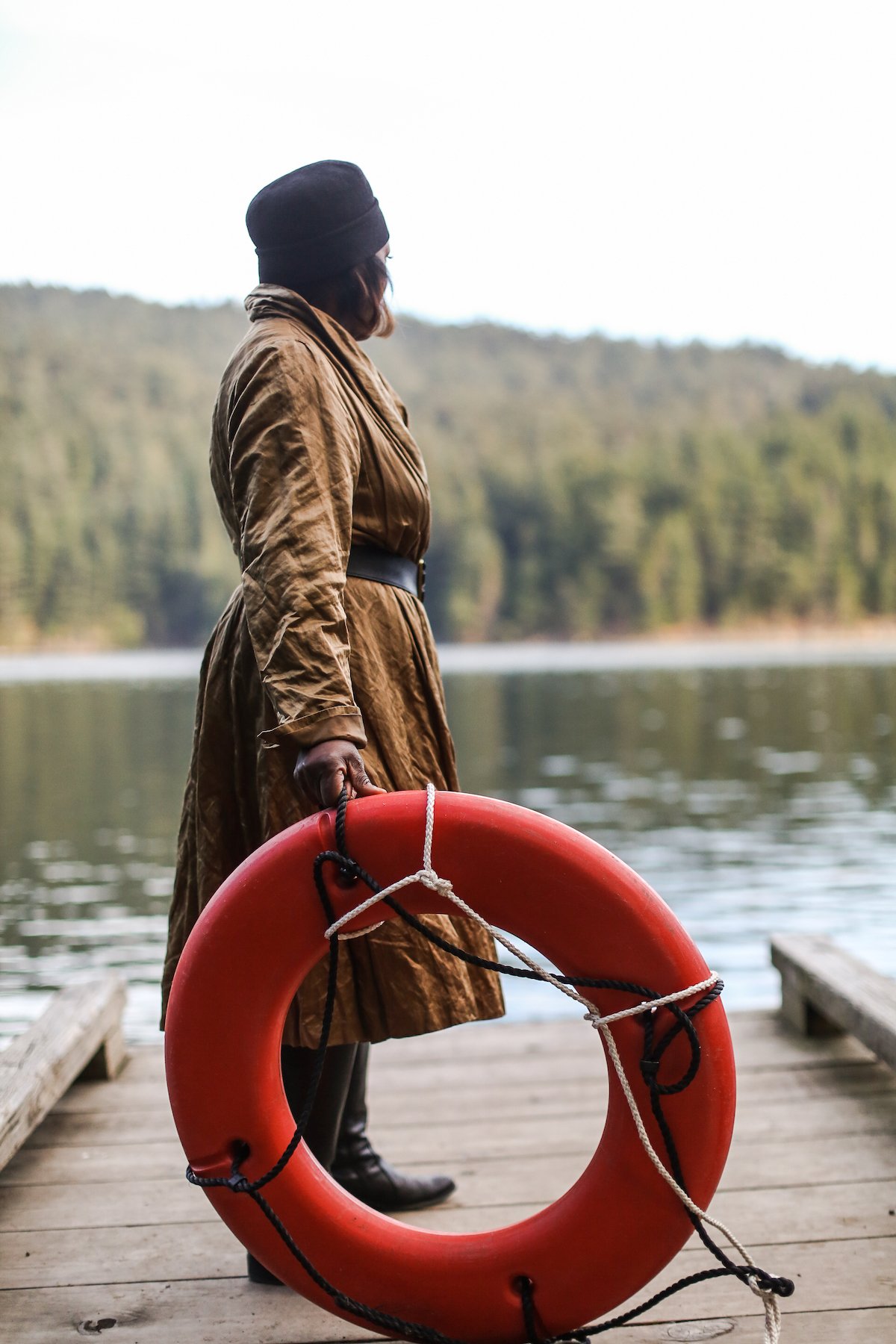


“Art is the highest expression of the human spirit. It’s how we communicate with one another. ”
— Woman in the Woods
The Inspiration Behind Woman in the Woods
There is so much raw beauty on this remote island of ours that it’s easy to understand why people are lured here. Why people stay is a more complex matter, and the answer to that question is often more profound.
“I could cry,” are the first words Michell “Mitch” Marshall speaks when she sits down to discuss her life and the inspiration behind Woman in the Woods, the non-profit arts organization that she founded in 2017. “It has been an emotional journey, with a lot of painful experiences,” she admits, “but if I had to do it all over again, pain included, I would do it in a heartbeat.”
“I had the most wonderful, intense, childhood,” is how Mitch describes growing up in Boulevard Park, a small town eight miles south of Seattle, then Burien. She doesn’t remember ever seeing another black family in the community, but she does remember kids throwing rocks at her because of the color of her skin. As she shares the stories of her childhood, it’s clear that to truly understand why Mitch is such a positive force, one must first get to know her father, Charles Silicious Woods.
Charles, an engineer at Boeing and a bass-baritone for the Seattle Madrigal Society, loved opera, played piano and held musical salons in the family’s living room. He and Mitch’s mom, Ophelia, exposed Mitch and her three sisters to art from an early age, which was not the norm. One of her strongest memories is of her dad, using the nickname that only he used, telling her: “Shorty, you’re going to have to be better than everyone else because they’re going to expect you to be mediocre.” He was preparing Mitch for a lifetime of prejudice, and she took it to heart.
Charles taught the kids in their neighborhood to play piano and, like the Mitch we know, when he thought he could improve something in the community, he did. “My dad took it upon himself to start a petition to get a stoplight installed at a busy corner of 136th street in Burien after several car accidents happened there. When he was visiting neighbors to get their signatures, one of them told him: “You know, there’s another petition going around. It’s to get you out of the neighborhood.” I don’t know what happened with that petition, but my dad’s petition got us a stoplight that still remains today, and people long referred to it as the Charles Woods Light.”
As an adult, Mitch was happy to discover Orcas Island. When she saw the rustic hamlet of Olga for the first time, it reminded her of the best parts of her childhood, and she felt “deeply comfortable.” In 2007, her husband Doug was retired as a corporate attorney, she gave up her job in finance at Microsoft, and they made the permanent move to Orcas Island, where they bought the 40-year-old Office Cupboard, and they built their home in West Sound. However, after settling in, Mitch experienced the feeling that nothing had really changed. “People would walk into the shop and remark on the color of my skin,” she explains. There was no maliciousness, but a frustrating level of ignorance and insensitivity. There was a focus, sometimes unconscious, sometimes not, on how she didn’t fit in rather than how she did.
“I actually thought about leaving the island,” she confesses. “I was walking around Mountain Lake, not another soul around, contemplating what I should do. I knew I would miss the sheer beauty and the serenity of the island, and that saddened me. As I made my way through the cedars, I decided that I could make the island feel more like my home, too. I will add to the beauty, I thought. With each step, the more I came to believe that I could change the social landscape. By the time I reached my car, the vision had crystallized. I was going to use performance art to start a conversation—a powerful one.”
“There is so much raw beauty on this remote island of ours that it’s easy to understand why people are lured here. Why people stay is a more complex matter, and the answer to that question is often more profound. ”
— Michell “Mitch” Marshall
Mitch finished her three-year term as President of the Orcas Island Chamber of Commerce and threw herself into the creation of Woman in the Woods with Doug, and a board led by president Norm Stamper, a retired Seattle Police Chief, and fellow lover of the arts.
Since then, the mission has been to seek and promote a better understanding and appreciation of racial and cultural differences through various forms of artistic expression. Woman in the Woods has hosted Poetry Grand Slam champion Alex Dang; Blackbird, a genre-jumping collaboration with Marc Bamuthi Joseph and Daniel Bernard Roumain; and Guggenheim Fellow, cellist and artist Paul Rucker.
When faced with what was lacking on our remote island, when it may have been easier to simply leave, Mitch chose to stay—to make a positive difference. It’s that indomitable modern pioneer spirit and determination that adds a rare kind of beauty that other isolated communities lack. Woman in the Woods shows are avant-garde and wildly entertaining, but you also spend part of the time with a lump in your throat. As Mitch puts it, “I always knew the art I wanted to bring to the island would not be easy. The most moving art is born out of blood, sweat, and tears, and sometimes that can be hard for an audience, but hard can be so uplifting.”
Photos by Coventry Automatik. Words courtesy of Ōde & Ayn Carrillo Gailey
